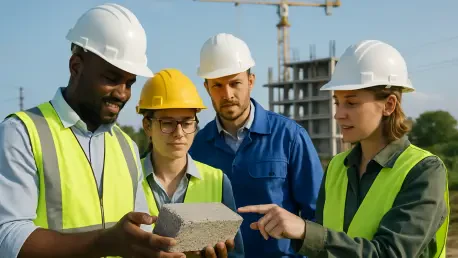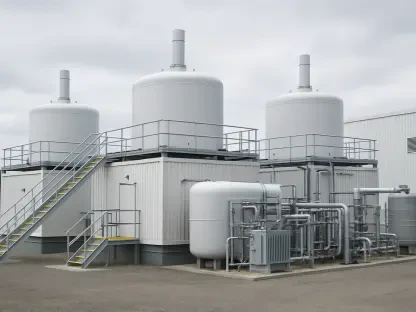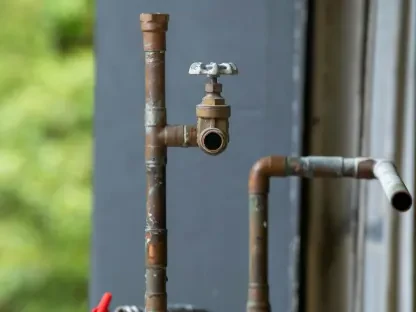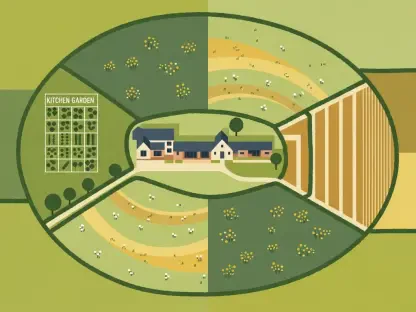In a world where construction is a cornerstone of economic growth, the environmental toll of the cement and concrete industry looms large, accounting for roughly 8 percent of global carbon emissions. As urban landscapes expand and infrastructure demands soar, the need for sustainable alternatives has never been more pressing, especially with projections showing significant industry growth over the coming decades. A groundbreaking initiative has emerged to tackle this challenge head-on, uniting major corporations and innovative strategies to transform the way construction materials are sourced and produced. This alliance, known as the Sustainable Concrete Buyers Alliance (SCoBA), spearheaded by RMI and the Center for Green Market Activation, represents a pivotal step toward reducing the carbon footprint of one of the most emission-intensive sectors. With heavyweight founding members like Amazon, Prologis, and Meta on board, the initiative is poised to redefine industry standards and accelerate the adoption of low-carbon solutions.
Pioneering a Sustainable Construction Future
Building a Collective Force for Change
The formation of SCoBA marks a significant milestone in addressing the environmental challenges posed by traditional cement and concrete production. This alliance brings together leading organizations committed to slashing emissions through a unified approach, focusing on the procurement of low-carbon materials for building and infrastructure projects. By pooling the influence of major industry players, SCoBA creates a powerful demand signal that encourages producers to pivot toward greener alternatives. The urgency of this mission is underscored by the limited availability of sustainable options in today’s market, a gap that the alliance aims to bridge through innovative mechanisms. Beyond just reducing emissions, this collaborative effort seeks to establish new benchmarks for sustainability in construction, ensuring that environmental considerations are embedded in every stage of material sourcing and use. The involvement of prominent corporations lends credibility and scale, amplifying the potential for widespread impact across the sector.
Innovating with Market Mechanisms
At the heart of SCoBA’s strategy lies a novel approach to incentivizing sustainable production through environmental attribute certificates. This “book and claim” system enables companies to acquire the environmental benefits of low-carbon cement, clinker, and concrete, even when direct access to these materials is limited. Such a mechanism not only helps firms lower their supply chain emissions but also channels crucial revenue into capital-intensive decarbonization projects within the industry. By aggregating demand from its members, SCoBA fosters favorable market conditions that motivate producers to invest in cutting-edge technologies and infrastructure upgrades. This initiative is a game-changer, as it aligns economic incentives with environmental goals, creating a viable pathway for scaling up cleaner construction materials. The focus on certificates also allows flexibility, ensuring that companies of varying sizes and geographic locations can participate in the push for sustainability without immediate access to physical low-carbon products.
Scaling Impact through Strategic Actions
Setting the Stage for Procurement
Looking ahead, SCoBA is gearing up to launch a competitive procurement process to connect its members with leading producers of low-carbon cement and concrete certificates. This effort begins with an active request for information (RFI), designed to gather critical insights from suppliers about the availability and performance of sustainable materials. The RFI also explores the practicalities of integrating a book and claim system into existing supply chains, identifying both opportunities and hurdles in this innovative approach. By engaging directly with producers, SCoBA aims to ensure that collective demand translates into actionable agreements, paving the way for real-world implementation of low-carbon solutions. This step is vital in addressing the embodied carbon in high-emission structures like warehouses and data centers, which are central to modern economies. The procurement process promises to be a catalyst, driving momentum for broader industry transformation.
Unlocking Economic and Environmental Potential
Decarbonizing the cement and concrete sector is not just an environmental imperative but also a significant economic opportunity, as emphasized by industry leaders involved in SCoBA. The alliance is committed to establishing rigorous standards that will guide the transition to sustainable materials, turning collective demand into tangible offtake agreements. This approach encourages innovation in low-carbon cement blends and emerging technologies, which are essential for reducing the carbon intensity of construction. Collaborative action is seen as the key to overcoming the entrenched barriers of embodied carbon, particularly in large-scale projects that dominate urban development. By fostering investment in sustainable production facilities, SCoBA’s efforts are expected to yield long-term benefits, balancing ecological responsibility with economic growth. The initiative reflects a shared understanding among stakeholders that joint strategies can achieve what individual efforts cannot, setting a powerful precedent for other carbon-intensive industries to follow.









